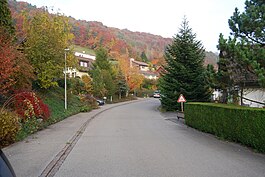Dättlikon
Dättlikon | |
|---|---|
 | |
| Coordinates: 47°31′N 8°38′E / 47.517°N 8.633°E | |
| Country | Switzerland |
| Canton | Zurich |
| District | Winterthur |
| Area | |
| • Total | 2.89 km2 (1.12 sq mi) |
| Elevation | 386 m (1,266 ft) |
| Population (31 December 2018)[2] | |
| • Total | 789 |
| • Density | 270/km2 (710/sq mi) |
| Time zone | UTC+01:00 (Central European Time) |
| • Summer (DST) | UTC+02:00 (Central European Summer Time) |
| Postal code(s) | 8421 |
| SFOS number | 0215 |
| ISO 3166 code | CH-ZH |
| Surrounded by | Buch am Irchel, Embrach, Freienstein-Teufen, Neftenbach, Pfungen |
| Website | www SFSO statistics |
Dättlikon is a municipality in the district of Winterthur in the canton of Zürich in Switzerland.
History
[edit]Dättlikon is first mentioned in 1241 as Tetelinkhoven.[3]
Geography
[edit]Dättlikon has an area of 2.9 km2 (1.1 sq mi). Of this area, 43% is used for agricultural purposes, while 45.7% is forested. Of the rest of the land, 9.6% is settled (buildings or roads) and the remainder (1.7%) is non-productive (rivers, glaciers or mountains).[4] In 1996[update] housing and buildings made up 5.6% of the total area, while transportation infrastructure made up the rest (3.8%).[5] Of the total unproductive area, water (streams and lakes) made up 1% of the area. As of 2007[update] 9.6% of the total municipal area was undergoing some type of construction.[5]
The municipality is located on the southern terrace of Irchel evelvation, in the lower Töss Valley. It consists of the village of Dättlikon and the settlement Blumetshalden an der Töss.
Demographics
[edit]Dättlikon has a population (as of 31 December 2020) of 797.[6] As of 2007[update], 7.5% of the population was made up of foreign nationals. As of 2008[update] the gender distribution of the population was 51.2% male and 48.8% female. Over the last 10 years the population has grown at a rate of 19.6%. Most of the population (as of 2000[update]) speaks German (96.8%), with English being second most common ( 0.8%) and Portuguese being third ( 0.6%).
In the 2007 election the most popular party was the SVP which received 39% of the vote. The next three most popular parties were the SPS (19.1%), the CSP (13.2%) and the FDP (10.5%).
The age distribution of the population (as of 2000[update]) is children and teenagers (0–19 years old) make up 26.1% of the population, while adults (20–64 years old) make up 62.4% and seniors (over 64 years old) make up 11.5%. The entire Swiss population is generally well educated. In Dättlikon about 88.6% of the population (between age 25–64) have completed either non-mandatory upper secondary education or additional higher education (either University or a Fachhochschule). There are 200 households in Dättlikon.[5]
Dättlikon has an unemployment rate of 1.43%. As of 2005[update], there were 27 people employed in the primary economic sector and about 9 businesses involved in this sector. 39 people are employed in the secondary sector and there are 13 businesses in this sector. 38 people are employed in the tertiary sector, with 11 businesses in this sector.[4] As of 2007[update] 43.8% of the working population were employed full-time, and 56.3% were employed part-time.[5]
As of 2008[update] there were 128 Catholics and 381 Protestants in Dättlikon. In the 2000 census, religion was broken down into several smaller categories. From the census[update], 71.6% were some type of Protestant, with 70.1% belonging to the Swiss Reformed Church and 1.5% belonging to other Protestant churches. 18.5% of the population were Catholic. Of the rest of the population, 0% were Muslim, 1.7% belonged to another religion (not listed), 0.4% did not give a religion, and 7.8% were atheist or agnostic.[5]
The historical population is given in the following table:[3]
| year | population |
|---|---|
| 1634 | 156 |
| 1850 | 396 |
| 1900 | 354 |
| 1920 | 409 |
| 1930 | 338 |
| 1950 | 361 |
| 2000 | 529 |
References
[edit]- ^ a b "Arealstatistik Standard - Gemeinden nach 4 Hauptbereichen". Federal Statistical Office. Retrieved 13 January 2019.
- ^ "Ständige Wohnbevölkerung nach Staatsangehörigkeitskategorie Geschlecht und Gemeinde; Provisorische Jahresergebnisse; 2018". Federal Statistical Office. 9 April 2019. Retrieved 11 April 2019.
- ^ a b Dättlikon in German, French and Italian in the online Historical Dictionary of Switzerland.
- ^ a b Swiss Federal Statistical Office Archived January 5, 2016, at the Wayback Machine accessed 14-Aug-2009
- ^ a b c d e Statistics Zurich (in German) accessed 4 August 2009
- ^ "Ständige und nichtständige Wohnbevölkerung nach institutionellen Gliederungen, Geburtsort und Staatsangehörigkeit". bfs.admin.ch (in German). Swiss Federal Statistical Office - STAT-TAB. 31 December 2020. Retrieved 21 September 2021.
External links
[edit]- Official website (in German)
- Dättlikon in German, French and Italian in the online Historical Dictionary of Switzerland.




